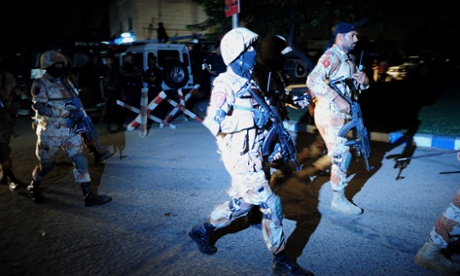Karachi, Jun 9: Gunmen attacked one of Pakistan's biggest airports on Sunday and at least 23 people were killed, including all 10 of the attackers, media reported.
The attack on Jinnah International Airport in Karachi, Pakistan's sprawling commercial hub of 18 million people, took place as Prime Minister Nawaz Sharif's government tries to engage Pakistani Taliban militants in negotiations to end years of fighting.
Gun battles went on for several hours and television pictures showed fire raging at the airport as ambulances ferried casualties away, but by dawn on Monday, the army said the airport had been secured.
“(The attackers) were confined to two areas and eliminated,” the Dawn newspaper cited military spokesman Major-General Asim Bajwa as saying.
There was no immediate claim of responsibility, but Pakistani Taliban militants, allied with but separate from the Afghan Taliban, are battling to overthrow the Pakistani state and impose their hardline vision of Islamist rule.
Earlier, officials said all flights had been diverted.
Peace talks between the government and the Pakistani Taliban have failed in recent months, dampening hopes of reaching a negotiated settlement with the insurgency, which continues attacks against government and security targets.

7 security men, 4 militant killed in attack on Karachi airport
At least 23 persons, including seven security personnel, have been killed when heavily armed militants attacked the Jinnah International Airport's old terminal in Pakistan's financial capital Karachi.
Around 10 to 12 men armed with explosives and ammunition dressed in airport security personnel uniforms entered the Fokker building at the old airport terminal late last night, police sources said.
Heavy contingents of Pakistan army and police have been called in and had surrounded the Fokker building where the attackers were holed up.
A gun battle was still continuing inside the old airport near the hangers and workshop as military and other security personnel tried to clear up the runaway and surrounding area from the terrorists.
Plumes of smoke and fire could be seen inside the old airport and a few loud explosions were also heard near the workshop and hanger area.
A spokesman of the Inter Services Pubic Relations confirmed that army units had been called from the nearby Malir cantonment base and said so far three terrorists had been killed in the gun battle while one blew himself up.
Security forces had cleared up one side of the old airport after killing the terrorists but there was still resistance and heavy gunfire coming from another direction near a workshop, Sindh police spokesman said.
“They are 11 dead bodies inside right now including one police official and some ASF jawans but three terrorists have been killed while one blew himself up as we corned him,” the spokesman, Imran Shaukat told reporters.
He denied that the terrorists had succeeded in blowing up or damaging the aircraft on the runaway.
“No aircraft has been hit or damaged although the terrorists are carrying RPG rockets. The explosion and fire is because some oil tankers caught fire on the runaway,” he said.
A spokesman for the paramilitary rangers also confirmed that four terrorists had been killed and said seven more were suspected to be hiding inside a hanger building.
He said all passengers and airport staff had been moved to safe places and the aircrafts secured with security personnel securing them from terrorist attacks.
But a source in the Civil Aviation Authority told PTI that the number of casualties could be high as several civilians had been killed or injured when the terrorists entered the airport terminal building.
All flight operations at Jinnah Terminal have been suspended and all routes to the airport have been sealed.
A spokesman for the Pakistan International Airlines (PIA) said that passengers and visitors at the Jinnah international airport which is close to the old terminal building had been shifted to safe and secure locations.
“The airport runaway is secured now and the passengers and visitors safe. The operation to apprehend these attackers is expected to end soon,” he said.
Immediately after the daring attack all flight operations were suspended from the Jinnah international airport with flights not taking off and those scheduled to land in Karachi being diverted to Nawabshah and Quetta or turning back to their original destinations.
“Security high alert has also been sounded off at the other airports of the country,” a ASF spokesman said.
Television footages showed heavy firing going on at the old terminal building and loud explosions were also heard on the runaway.
Reports confirmed that a young PIA engineer, Fakhar was also killed in the attack as he was on duty at one of the engineering workshops where aircrafts are overhauled.
Sindh health minister, Sagheer Ahmed said 10 bodies including seven personnel of the ASF and 15 injured had been brought to the Jinnah hospital. “Our reports state that so far 13 people have been killed in the attack,” he said.
The attack is reminiscent of the deadly attack carried out by some 15 militants of the Tehreek-e-Taliban in May, 2011 on the Mehran naval airbase here in which the attackers killed some 18 personnel and damaged aircrafts before being killed in a counter attack.
Defence minister, Khawaja Asif described the attack as cowardly and said it was another example of how terrorists were trying to destroy important installations and locations of the government.
“But I can tell you these terrorists will not succeed in their aims and will be defeated,” Asif said.
The attack came days after a peace process between the Tehreek-e-Taliban broke down and a ceasefire announced by the TTP was called off.
Since then than there has also been a major break in the TTP with the powerful Mehsud group announcing their separation from the militant outfit led by Maulana Fazlullah.
The Mehsud group commanders had warned of resuming attacks against the government and security personnel and installations.





Comments
Add new comment